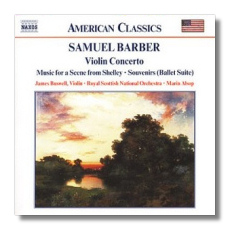
The Internet's Premier Classical Music Source
Related Links
- Barber Reviews
- Latest Reviews
- More Reviews
-
By Composer
-
Collections
DVD & Blu-ray
Books
Concert Reviews
Articles/Interviews
Software
Audio
Search Amazon
Recommended Links
Site News
 CD Review
CD Review
Samuel Barber

- Violin Concerto
- Souvenirs (Ballet Suite)
- Serenade for Strings
- Music for a Scene from Shelley
James Buswell, violin
Royal Scottish National Orchestra/Marin Alsop
Naxos 8.559044 DDD 64:20
From James Buswell's opening notes in the Violin Concerto, we know that all is going to be well with this recording. The warmth and relaxation of the playing are immediately palpable, and who can blame the listener if he lets out a few sighs of contentment? That's not to say that there's no tension, however; the first climax three minutes into the movement is fraught with drama. Throughout, there's wonderful give and take between Buswell and Alsop, and one can't help but assert, after hearing this recording, that Barber's work is the finest American violin concerto yet to be written. The Royal Scottish National Orchestra is alert and sympathetic. I don't know a bad recording of this concerto, but with music-making this atmospheric and Naxos' budget prices, it is easy to favor this new one. The balance between soloist and orchestra is good.
Alsop doesn't make a false step for the remainder of their program, either. (The new Penguin Guide to Compact Discs calls her "a shooting star in the firmament of international conductors"!) Souvenirs, originally a suite for piano four-hands, is redolent of "a divertissement in a setting of the Palm Court of the Hotel Plaza in New York, the year about 1914, epoch of the first tangos." Barber suggests that these Souvenirs are to be "remembered with affection, not in irony or with tongue in cheek, but in amused tenderness." In other words, what is called for is an American Poulenc from the era of Les biches. Alsop admirably catches the atmosphere of delicious sin rubbing elbows with innocence. The music dances, and Barber's peppery wrong-note lyricism charms.
The Serenade for Strings dates – in its original version for string quartet – from Barber's nineteenth year. In spite of some rhythmic kinks and unexpected harmonic shifts, the first and last movements are a little foursquare, but the middle movement is hauntingly pallid. In any case, the Serenade doesn't outstay its welcome because it is barely ten minutes long. The Scottish strings are full but not smothering.
Barber wrote Music for a Scene from Shelley in Italy when he was in his early 20s. He claimed it was non-programmatic, although it is strongly emotional and impressionistic. Alsop is a full minute slower than Golschmann on his Vanguard recording, and her reading surpasses Golschmann's in every way.
This is Alsop's third Barber collection for Naxos; its predecessors are just as strongly recommendable. I'm looking forward to hearing what she will do with the Second and Third Essays for Orchestra.
Copyright © 2002, Raymond Tuttle


















